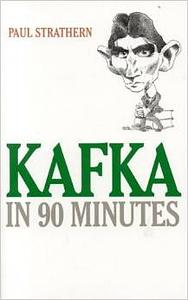Take a photo of a barcode or cover
This book is exactly what it says, a biography of Franz Kafka read in 90 minutes. It succinctly tells the story and life of the titular author, going through his personal life as well as his works, delving into psycho-analytics of his writings. Due to the content and nature of the book, spoilers for his writings are prevalent so if you have a desire to read his books for yourself, I suggest doing so before reading this one, namely, the trial, investigations of a dog, the metamorphosis, the castle, letter to my father, and a smattering of his short stories.
Good little book about one of the greatest writers in modern history.
Good little book about one of the greatest writers in modern history.
«هرچه زندگی کافکا بیشتر با احساس پوچی ناشی از ناکامی و ضعف عجین میشد، نیازش به نوشتن برایش واضحتر میشد. به نظر میرسید نوشتن تنها چیزی بود که زندگی بیارزشش را ارزنده میکرد. کافکا بیتوجه به ضعف جسمانی، وضع مزاجی و حساسیتهای ذهنی شکنندهاش به نوشتن ادامه داد. چیزی نگذشت که از خود گذشتگیاش در راه این وظیفه از مرز لجاجت گذشت و تبدیل به محقق کنندهی یک نیاز غایی معنوی شد.خودش میگفت:«نوشتن همانا نیایش است.». »
This is my third or fourth Paul Strathern summary of someone, and it was my favorite. That might be because I knew absolutely nothing of Franz Kafka before this little book. Or it might be the writing or story-telling was better, who knows.
That said - here's what to expect: a thorough biography of the man along with his historical context, and a brief summary and interpretation of his major works. For me, that was just what I was looking for. I do believe I'm going to try and read/listen to Kafka's Metamorphosis and the Trial, and given my shallow taste in literature, I honestly expect I won't like them. Hah. I felt that way about Camus, Lewis Carroll and Flannery O'Connor - there's little doubt that the great writers write in layers I don't understand. Kafka leaves his stories up to interpretation, which normally I'm impatient with, and probably means I'm more of prose-type-o-fellow.
The thing I'll probably most remember though is Kafka's story. He died at 40 with TB, practically unheard of and left a pile of manuscripts with his only friend Max Bord, and told him to not read them and then to burn the lot of it. Thankfully he did not. Bord, himself a successful writer - lived to the ripe age of 84 and published (I believe it was) 83 works. Today Kafka is revered as one of the greatest writers of the 20th century. Bord seems to be barely remembered as little more than Kafka's biographer. My question is this: if you could chose to live one of their lives, which would you choose? :)
That said - here's what to expect: a thorough biography of the man along with his historical context, and a brief summary and interpretation of his major works. For me, that was just what I was looking for. I do believe I'm going to try and read/listen to Kafka's Metamorphosis and the Trial, and given my shallow taste in literature, I honestly expect I won't like them. Hah. I felt that way about Camus, Lewis Carroll and Flannery O'Connor - there's little doubt that the great writers write in layers I don't understand. Kafka leaves his stories up to interpretation, which normally I'm impatient with, and probably means I'm more of prose-type-o-fellow.
The thing I'll probably most remember though is Kafka's story. He died at 40 with TB, practically unheard of and left a pile of manuscripts with his only friend Max Bord, and told him to not read them and then to burn the lot of it. Thankfully he did not. Bord, himself a successful writer - lived to the ripe age of 84 and published (I believe it was) 83 works. Today Kafka is revered as one of the greatest writers of the 20th century. Bord seems to be barely remembered as little more than Kafka's biographer. My question is this: if you could chose to live one of their lives, which would you choose? :)
It is what it is and what it is is a published wiki entry
challenging
dark
emotional
informative
mysterious
reflective
sad
fast-paced
Sunday, August 1, 2021
"Any interpretation of Kafka involves self-revelation."
"Kafka's body was buried in the eastern suburbs of Prague. A simple tombstone was inscribed with the name "Dr. Franz Kafka." His parents, evidently, felt it was appropriate only to mention his legal doctorate; no reference was made to the fact that he was a writer.
In 1931 his father died and was buried beside him.
3 years later, his mother died and was also buried in the family plot.
All 3 names were inscribed on the same tombstone. Even in death, Kafka did not escape his family or their lack of recognition of his achievement."
Oh, the irony.
In 1931 his father died and was buried beside him.
3 years later, his mother died and was also buried in the family plot.
All 3 names were inscribed on the same tombstone. Even in death, Kafka did not escape his family or their lack of recognition of his achievement."
Oh, the irony.

